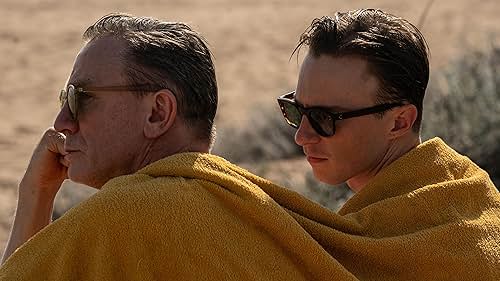
Director Luca Guadagnino returns to cinemas with his new film Queer. Set in 1950s Mexico City, the film follows Lee (Daniel Craig), an American who has sought refuge in the country after following a drug bust. He soon runs into a discharged Navy serviceman named Eugene (Drew Starkey) and becomes infatuated with the younger man whose sexuality he can’t quite figure out at first.
Queer ultimately feels like the tale of two films, with its story differentiating wildly between its first two acts and its finale. To start, the film tells the story of obsession and addiction through Lee, who begins with a heroin addiction but also becomes addicted to Eugene. Lee is obviously searching for intimacy and a respite from his own sadness and loneliness and ultimately believes Eugene to be the cure-all. His obsession quickly turns to desperation as Eugene turns out to just be a young man and not a savior. It’s a slightly interesting concept, even if it lacks a bit of heft or something to pull you in.
Queer then takes a dramatic turn once Lee and Eugene reach South America and finally find Lee’s white whale in the form of the elusive hallucinogen ayahuasca. After building rapport with researcher, the two finally are allowed to partake and embark upon their journey toward enlightenment. What follows is a bit of nonsensical psychedelic experience for Lee that results in the cliche bizarre visuals of a person on a trip that is meant to delve the audience deeper into the character’s id and inner turmoil. Despite the intention, it makes the film feel as if it takes a random turn toward something overly esoteric and pretentious in all the ways that stereotypes art house cinephiles rather than profound filmmaking.
Until this point, Queer is slightly meandering but at least minimally interesting as it follows Lee’s bout with infatuation, but this attempt at overly complicating his issues leads to an unsatisfactory conclusion to the story of their love affair and ends up undercutting any point that was being made about the psychological aspects of the human tendency toward obsession, particularly in a romantic context. Had the film stuck the landing, something at least somewhat meaningful about the topic could have been explored, but the attempt at high art and its failure to fully land blunts that potential. Craig gives a decent performance with the material he’s given, but past the pre-release novelty of his portrayal of a homosexual man, there’s not much to write home about there either. Queer feels like a talented filmmaker who overindulged his usually quality impulses.
Image: A24

